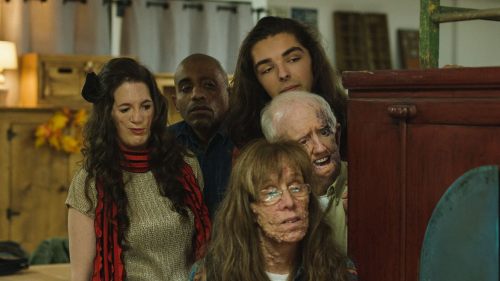Fantastic Fest Review: YOU DON’T NOMI Gives SHOWGIRLS The Reappraisal It Deserves
In the almost 25 years since Showgirls was initially released, the reactions have distilled and coagulated into a few different pools of perception: There are those who appreciate it as an accidental cult favorite – a so-bad-it's-good treasure to be lovingly mocked at late-night screenings; there are some who still find Paul Verhoeven's film to be little more than misogynist melodrama steeped in senseless excess; and there are others who have come to appreciate Showgirls as a genuine cult classic – a film that has been wildly misunderstood by prudish American audiences resistant to filtering the graphic sexual material through Verhoeven's cynical satirical lens (for the record, I fall into this camp); and finally, those who believe the film to be an unintentional masterpiece, the resulting film vastly superior to the sum of its parts, which were not nearly as calculated as modern-day Verhoeven might lead you to believe. You Don't Nomi offers a fully dimensional exploration of the ways in which Verhoeven's film, famously derided and largely rejected by critics upon release, has been received, re-interpreted, and reappraised over the past 25 years.
McHale doesn't devote too much time to explaining the film to unfamiliar viewers, but for any who might be reading: Verhoeven's film, based on a script by Joe Eszterhas (who collaborated with Verhoeven on Basic Instinct), follows the exploits of Nomi Malone, played by former Saved by the Bell star Elizabeth Berkley – looking to shed the uptight feminist Jessie Spano persona that made her famous. Nomi arrives in Las Vegas with dreams of becoming a famous dancer and lands at a seedy strip club before ultimately writhing her way into the Stardust's crown jewel: Goddess, a dazzling adult production anchored by Gina Gershon's Cristal Connors. A battle ensues between Nomi and Cristal, the former taking ruthless measures to replace the latter. It is, from this perspective, a satire of the American dream that challenges our hypocritical view of sexuality – a garish Cinderella story about a woman seeking fame in an industry (and society) that simultaneously objectifies women while condemning their agency.
It would be too simplistic to describe Jeffrey McHale's documentary as a love letter to Showgirls, though it does contain a fair amount of praise from cultural critics, as well as the actress who starred in the off-Broadway musical based on Verhoeven's film. What McHale has created reads more like a visual compendium of critical essays that ditches the default talking heads format, replacing it with footage from Verhoeven's filmography in ways that are occasionally meta-textual in a way that's slightly, occasionally meta-textual and kinda campy (appropriate, given the subject matter). Though not a love letter necessarily, those who already adore Showgirls may feel as though You Don't Nomi is preaching to the converted; even still, the perspectives included offer enough nuance and criticism to challenge even the most devout among the congregation.
Borrowing heavily from Adam Nayman (who also contributes to the doc), author of the 2014 book It Doesn't Suck: Showgirls, the front half of You Don't Nomi is divided into chapters: "Piece of Shit," "Masterpiece," and "Masterpiece of Shit," examining Showgirls from each of these angles before delivering more nuanced and thoughtful analyses of the film and its creators. The doc could easily lose about 10-15 minutes from the back-half, when it takes a brief detour into Room 237 territory, analyzing the shot composition of Nomi and Cristal's lunch at Spago (the famous "Doggy Chow" bonding scene) and attempting to dissect the ultimately senseless recurring motifs from Eszterhas' script (these women sure do love to talk about doing their nails and eating chips!). But a far more fascinating idea emerges later in the documentary, when McHale shifts to the notion of reclaiming Showgirls – specifically, the pressing matter of Berkley's own view of the film, which nearly ruined her career. Many critics blamed Berkley's over-acting for the failure of Showgirls, convenientialy (or cruelly) ignoring Verhoeven's position as director. As Kyle MacLachlan – who plays the sleazy entertainment director of the Stardust and Cristal's beau – recounts in one clip, the actors were merely performing as instructed, all operating under the belieft that Verhoeven was making a sensational drama. Although Berkley herself never contributes to the documentary, clips of the actor show an interesting journey from defense to embarrassment to a diplomatic view of its cult status, before ultimately appearing at a sold-out screening of Showgirls attended by thousands of adoring fans. Berkley's embrace of the film gives You Don't Nomi a heroic conclusion, her journey to reclaim the film from its critics in a way that mirrors Nomi's own reclamation of her agency.
This portion of the doc is accompanied by commentary from April Kidwell, who portrayed Nomi in Showgirls! The Musical, and whose personal connection to the character lends You Don't Nomi its most surprising and thoughtful appraisal. A survivor of sexual assault, Kidwell developed a very specific appreciation of Showgirls and Nomi's story, channeling that trauma and emotion into a production that became a cult hit in its own right. It's only here that McHale's style, which relies entirely on footage from Verhoeven's library as well as midnight shows and stage satires (such as the musical), feels jarring and incongruous with the intent. But coupled with ongoing criticism of the film's plausible misogyny – or, at the very least, masculine ignorance – and this intriguing notion of a hero's journey, You Don't Nomi morphs into a thoughtful dissection of a film in which no singular view is right or wrong; every opinion and criticism is valid. Moreover, it's possible to love Showgirls while simultaneously acknowledging its flaws and contradictions. In a world that can't disentangle itself from binary thinking, that notion still feels downright rebellious.



